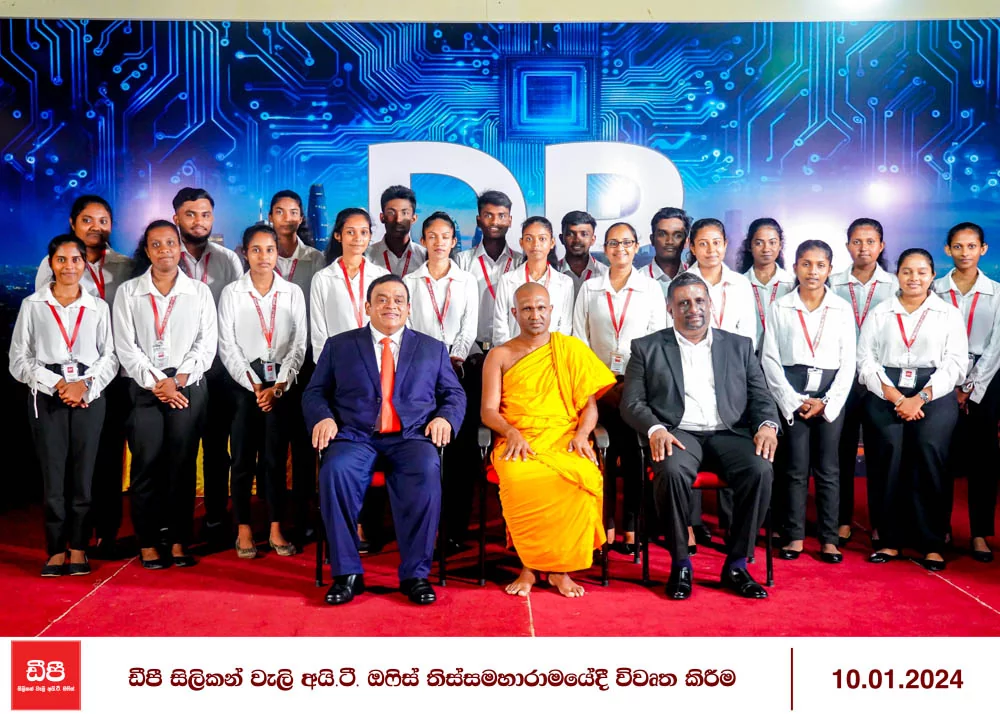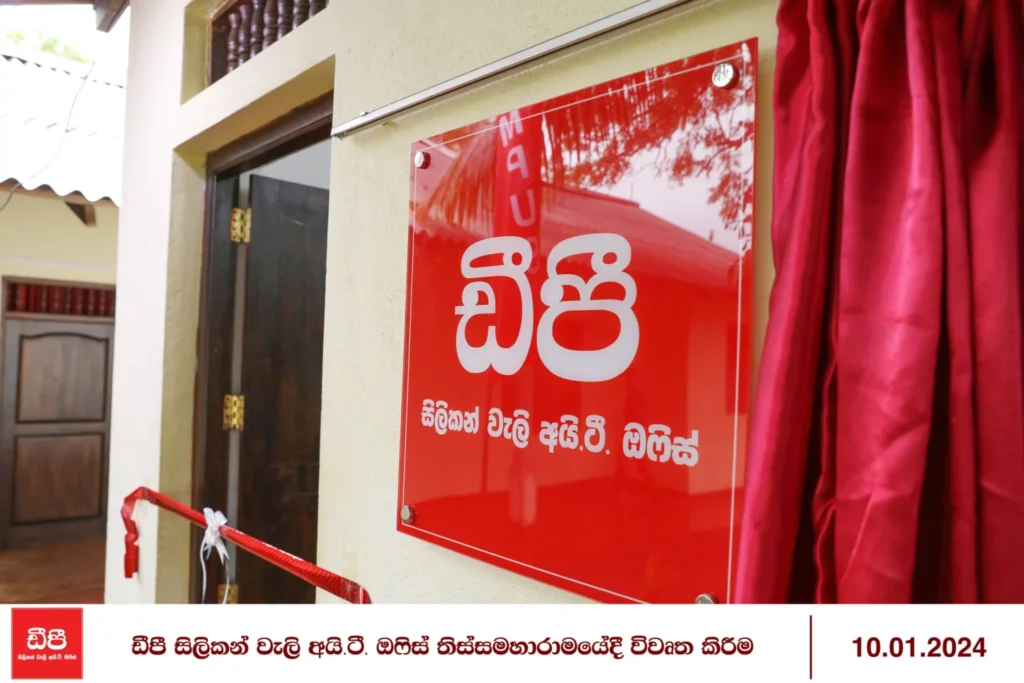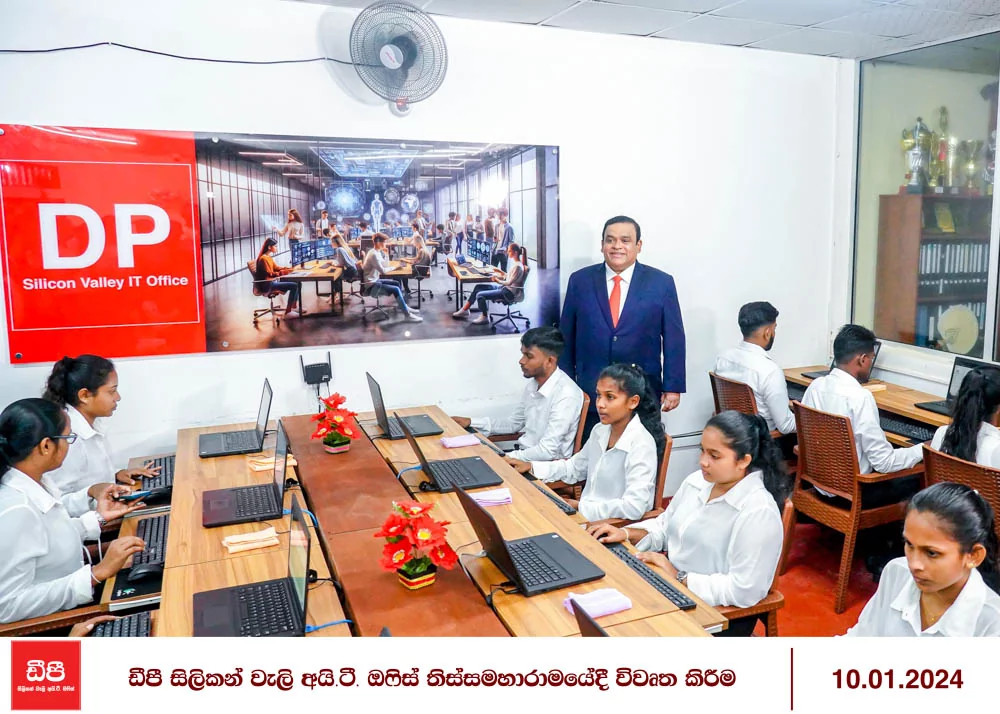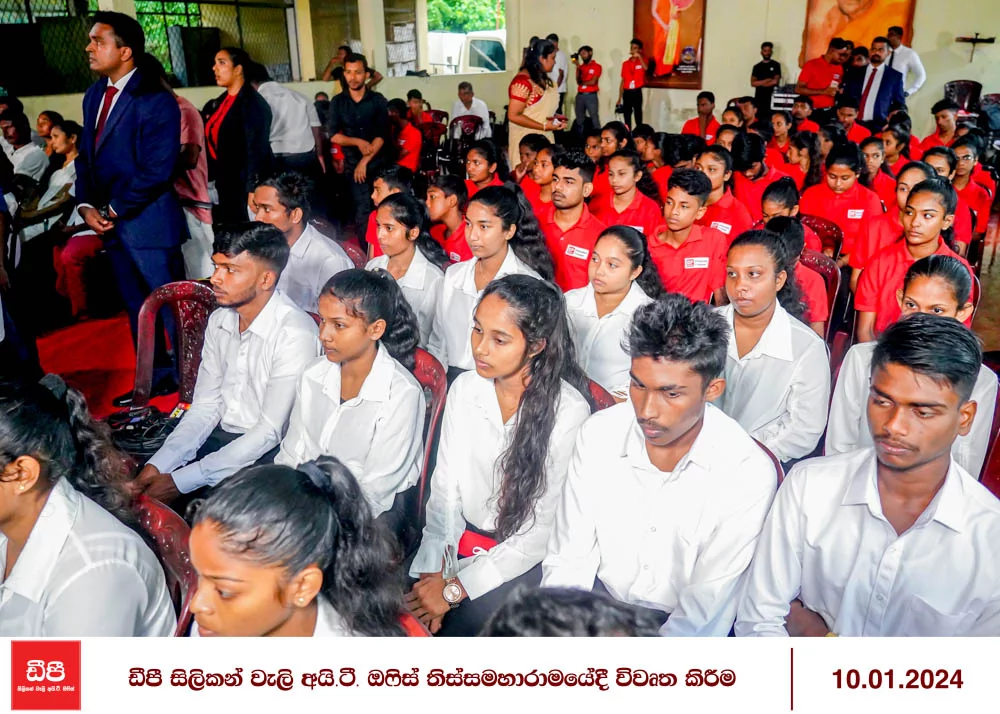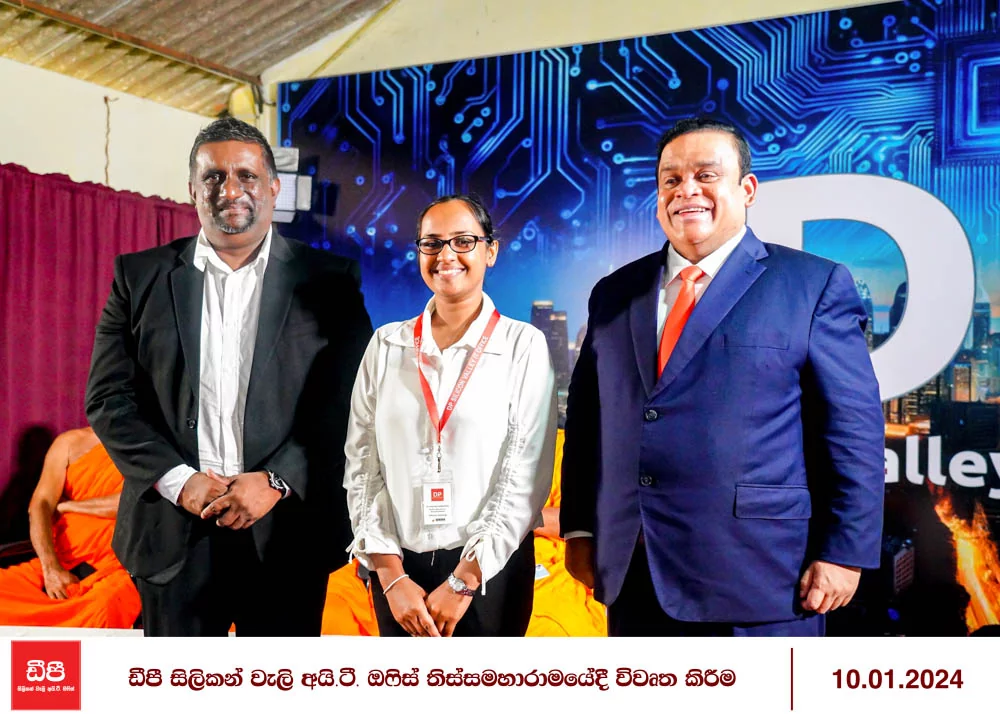In a significant move aimed at addressing the longstanding employment challenges in Sri Lanka, the “Dhammika and Priscilla Perera Foundation” inaugurated the first “Information Technology (IT) Job Zone” on January 10th in Tissamaharama.
The inauguration ceremony took place at the Uddhakandara Rajamaha Vihara, marking the establishment of the “DP Silicon Valley IT Office.”
Mr. Dhammika Perera, the Founder and Co-Chairman of “DP Education”, officially opened the DP Silicon Valley IT Office and emphasised its role in providing global job opportunities in the IT sector to the youth of Sri Lanka.
In his address, Mr. Perera highlighted the absence of large-scale career-providing industries since President JR Jayawardene’s free trade zones and President R. Premadasa’s garment factories, spanning over 33 years. He attributed this gap to the current foreign exchange crisis faced by the country.
Mr. Perera outlined his vision to create one million in the IT sector, aiming the alleviation of the economic challenges. To achieve this goal, he plans to establish IT job zones in every divisional secretariat across the island. The DP Silicon Valley IT Office in Uddhakandara Rajamaha Vihara is the first step towards realising this ambitious plan.
These IT job zones represent the next significant leap in the Sri Lankan economy, following the free trade zones and garment factories established by the past leaders, Perera demonstrated.
The DP Silicon Valley IT Office, functioning as the first employment centre under this initiative, has the capacity to employ 100 individuals. Currently, 20 young men and women have been successfully employed, having completed the necessary qualifications through DP Education’s free coding course and the web developer/web designer programme at the University of Moratuwa.
Remarkably, the qualification programmes undertaken by these newly employed individuals had a maximum duration of 6 months, highlighting the effectiveness of the educational initiatives offered by DP Education.
As the first IT job zone takes shape, it symbolises a groundbreaking development in Sri Lanka’s economic landscape, fostering hope for a brighter future for the country’s youth.
Perera further elaborated on the initiative, revealing that in alignment with the comprehensive plan to deliver computer language education to one million students in Sri Lanka by 2028, the establishment of 331 “DP Education IT Campus” centres is projected by 2025. Notably, 120 centres have already been inaugurated, achieving a significant milestone in the planned expansion, he added.
Within these IT campus centres, 110,000 students are actively enrolled in the computer language course, while an additional 130,000 students are pursuing the course through online platforms. This brings the cumulative count of students engaged in the DP Education Computer Language course to an impressive 240,000, reflecting the widespread impact of the educational initiative.
Furthermore, Perera highlighted the implementation of the IT Job Zone Creation Programme through a pilot project, revealing that currently, six DP Education IT Campus centres are in the process of establishment within the Tissamaharama Divisional Secretariat Division, marking a strategic step in realising the broader vision of creating employment opportunities in the Information Technology sector.
Full Statement by Mr. Dhammika Perera
In the wake of Mr. JR Jayawardena’s free trade zone period and Mr. R. Premadasa’s era of garment factories, we find ourselves in the inception of Dhammika Perera’s Information Technology Job Zone era. Commencing today, we are establishing the inaugural Information Technology Job Zone in the historic town of Tissamaharama. As of today, January 10, 2024, we proudly unveil the first job centre under the “DP Silicon Valley Office” at the Uddhakandara Temple. Allow me to elaborate on this significant development.
Our nation is an island and is of modest size. However, it is not an isolated entity; rather, it maintains a robust connection with the global community. The procurement of essential commodities, such as diesel, petrol, gas, pharmaceuticals, food items, vehicles, and technical equipment, is imperative for the well-being of our populace. Sustaining a high standard of living necessitates the importation of these goods, and this, in turn, mandates the acquisition of foreign exchange. Regrettably, our nation has faced economic challenges as we were unable to generate the requisite amount of foreign exchange, contributing to the prevailing economic crisis.
In the initial phases of our economic development, foreign exchange was garnered through the exportation of commodities such as tea, rubber, coconut, and other minor crops. However, with the progressive industrialisation of the global landscape, the demands of our populace have grown increasingly intricate. To address these evolving needs, a heightened requirement for foreign exchange has emerged. Consequently, initiatives were undertaken to bolster foreign exchange earnings, exemplified by the establishment of Free Trade Zones (FTZ) during the tenure of President J.R. Jayawardena and the subsequent inception of garment factories under President R. Premadasa. Remarkably, over the course of three decades, no additional large-scale industries have been established to contribute to foreign exchange generation, marking the onset of our current economic crisis.
In light of prevailing global economic conditions and their impact on our nation, the era of free trade zones and garment factories has concluded. Addressing the current economic crisis necessitates the swift implementation of measures to generate career opportunities on a significant scale, or otherwise, we may never recover from it.
In the current scenario of bankruptcy, attracting foreign investors poses a challenge, and even domestic investors exhibit reluctance to engage in substantial industrial ventures. The government, constrained by financial limitations, lacks the resources to spearhead investments in such industries. Despite these constraints, the imperative to navigate through this economic crisis remains crucial for our nation, comprising a population of 22 million, encompassing children, the youth, and the elderly. To secure the necessary foreign exchange for the well-being of our citizens, there is a collective contemplation on identifying a viable large-scale industry to propel our country forward.
Our predicament extends beyond a mere deficiency in financial resources for investments; time constraints exacerbate our challenges. The temporary alleviation of issues such as queues for oil and gas notwithstanding, the persistence of this crisis mandates a proactive approach. Although goods may currently be available in stores, the sustainability of the present situation is limited. Given the recurring nature of this crisis, it is imperative to expeditiously identify and implement measures to generate income and foreign exchange for the country.
The usual observation by many of us upon the emergence of an economic crisis or an election that the country’s national resources – such as phosphate from Eppawala, mineral sand from Pulmude, graphite from Bogala, and oil from Mannar – can build the nation. However, upon careful calculation, we came to conclude that none of them can provide a solution to the problem in our country at the moment.
The inception of the “DP Education” programme was driven by the conviction that the solution to our nation’s challenges lies fundamentally in the realm of education. Established in 2019, DP Education is dedicated to facilitating a quality education for the students of our country, thereby enabling them to secure gainful employment and establish improved living conditions. Recognising the pivotal role these students play as invaluable assets, their success in employment will not only benefit them individually but also contribute to the broader development of villages. It is imperative to devise strategies for channelling financial resources to these rural areas.
Amidst the economic crisis that erupted in 2022, our forward-looking perspective prompted contemplation on decisive measures to address the situation. It became evident that imparting vocational training to the youth was imperative, facilitating swift integration into the workforce. However, the financial constraints faced by the government rendered the establishment of new educational institutions, such as technical colleges, unfeasible. The establishment of private institutes posed another challenge, as the residents of our villages lacked the financial means to enrol in them or even afford transportation to education centres in the city. Currently, several vocational training courses extend over a three-year duration, a timeline incompatible with the urgency of the situation. Furthermore, the inability to generate career opportunities for approximately one million exacerbates the economic crisis. Identifying a solution necessitates exploring methods to create jobs within the villages. Analysing global job markets for sectors with optimal employment prospects and income potential became essential as we sought to navigate these complex challenges.
Under DP Education, we convened a consortium of scholars, professionals, and business leaders across diverse disciplines to undertake a comprehensive inquiry. This endeavour involved rigorous research and surveys to identify the most effective avenues for leveraging our limited resources. Subsequently, our focus converged on the realm of Information Technology as a strategic domain where we could optimise our resources. The objective is to provide education within the localities of these beneficiaries and secure career opportunities for them within their own villages, thereby contributing to the economic prosperity of these regions. This strategic choice is motivated by the recognition of challenges faced by parents who are unable to send their children to work in urban centres like Colombo or its suburbs. Moreover, even if individuals secure employment in such cities, a significant portion of their earnings is retained within the urban locale, resulting in diminished financial inflow to the village.
Our approach to this endeavour was characterised by thorough research, meticulous planning, and a concerted effort to avoid simplistic, impractical solutions, not as if we were hitting the mango tree with a stick. Acknowledging the absence of dedicated lecture halls and financial constraints for constructing such facilities, we strategically engaged with respected figures from various religious communities. Collaborative discussions were held with Buddhist monks, Catholic church fathers, Moulavis in mosques, and priests in Kovils. The “DP Education IT Campus” initiative was subsequently launched in February 2023, aligning with these religious institutions. This initiative is geared towards establishing 331 IT campuses, one for each divisional secretariat in the country. Remarkably, over 100 of these campuses have already been successfully established.
Educating children alone is insufficient; it is imperative to facilitate their initial career opportunities. Subsequently, they can harness the extensive global prospects within the IT sector for sustained career advancement. Given the urgency posed by the prevailing challenges in our country, expeditiously securing their first job becomes a priority. To address this imperative, deliberations were conducted with subject matter experts, scholars, and entrepreneurs actively involved in job creation within the IT sector. Collaborative efforts resulted in establishing partnerships with relevant organisations, culminating in the establishment of offices that currently serve as conduits for job opportunities emanating from the “Silicon Valley Office”.
The imperative of providing suitable workspaces for these career opportunities prompted the establishment of a comprehensive office infrastructure. In seeking a viable solution, consultations were initiated with esteemed monks and religious leaders. With their benevolent guidance and assistance, we are currently in the process of formulating and implementing plans to inaugurate Silicon Valley offices in all 14,000 villages nationwide. This initiative is designed to offer a secure and responsible working environment for the youth. Recognising the scale and complexity of this undertaking, we acknowledge that we cannot do this alone, for collaboration and support from various stakeholders are indispensable for the successful realisation of this endeavour.
But within a span of 11 months from the inception of the IT Campus programme, we have successfully inaugurated our inaugural Information Technology Job Zone. This achievement also marks the establishment of the first DP Silicon Valley Office centre, presenting the initial career opportunities for individuals. The swiftness with which we have implemented this initiative stands as a noteworthy accomplishment. In the Sri Lankan context, the expeditious provision of education and career opportunities in any other field is impossible.
Addressing a problem involves a strategic process of prudent decision-making, meticulous planning, garnering requisite support from key stakeholders, and the proficient execution of formulated plans. The consequential outcomes are tangible and observable manifestations of this methodical approach.
We, as a nation, must fortify ourselves against decline and actively engage in the reconstruction of our country for the prosperity of future generations. Mere discourse is insufficient; tangible efforts are imperative. It is gratifying to observe that one of the selected solutions is currently advancing successfully. We are happy about it.
Beyond just IT positions, DP Education has initiated a Language School encompassing instruction in English, Korean, and Japanese languages. Proficiency in these languages equips students to apply for career opportunities in the respective countries. Additionally, vocational training programmes have been launched, focusing initially on the elderly care service industry in Japan, with plans for expansion into other sectors. Concurrently, strategic plans are in development to provide students with the requisite education to attain qualifications enabling them to pursue employment in countries with abundant career opportunities worldwide. It is noteworthy that students enrolled in DP Education’s academic programmes are achieving commendable success in their studies, evident in their scholastic accomplishments and favourable examination results. These accomplishments position hundreds of thousands of students to secure lucrative positions across diverse fields in the future, aligned with their acquired skills.
Addressing a nation’s challenges necessitates thinking expansively and fostering ambitious aspirations, for thinking small is not enough. By creating a substantial workforce of two million through initiatives such as this, accompanied by the subsequent infusion of capital into villages and the consequent development of small and medium-scale enterprises (SME), the overarching problems facing our country can be effectively resolved. This transformative vision positions our nation as prosperous, although the realisation of such an outcome requires sustained effort over time. We have already embarked on this transformative journey, achieving notable success and garnering international acclaim. Notably, DP Education stands as the preeminent online school education platform in Asia, with the European Union recognising the accolades bestowed upon our “Full Stack Developer” course conducted in collaboration with the University of Moratuwa. With unwavering support from various stakeholders, we remain committed to providing an exemplary educational programme for the betterment of our children.
These are not accomplishments by ‘the businessman’ Dhammika Perera, nor the works of MP Dhammika Perera who got into politics. These are not even the works by DP Education, its team, the parents of the children, the Buddhist monks and the religious leaders, experts, scholars, or businessmen who lent their support in diverse capacities. These symbolise a collective national effort, involving all Sri Lankans. It is incumbent upon us to unite our endeavours to ensure the success of this initiative and, by extension, contribute to the advancement of our country. So, together, may we achieve this objective in our collective determination. We can do it. We will do it.
